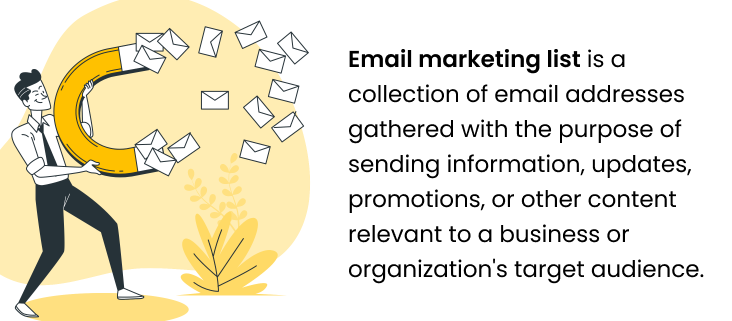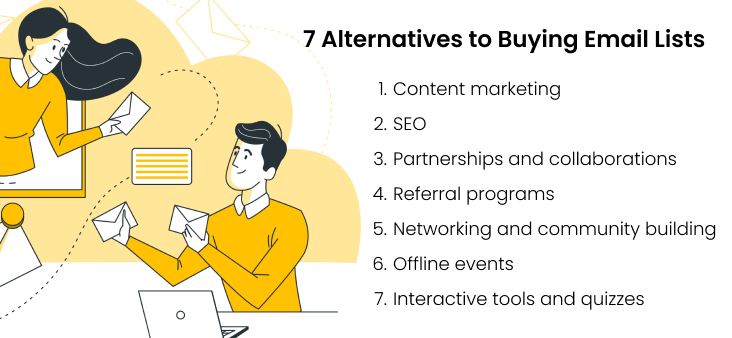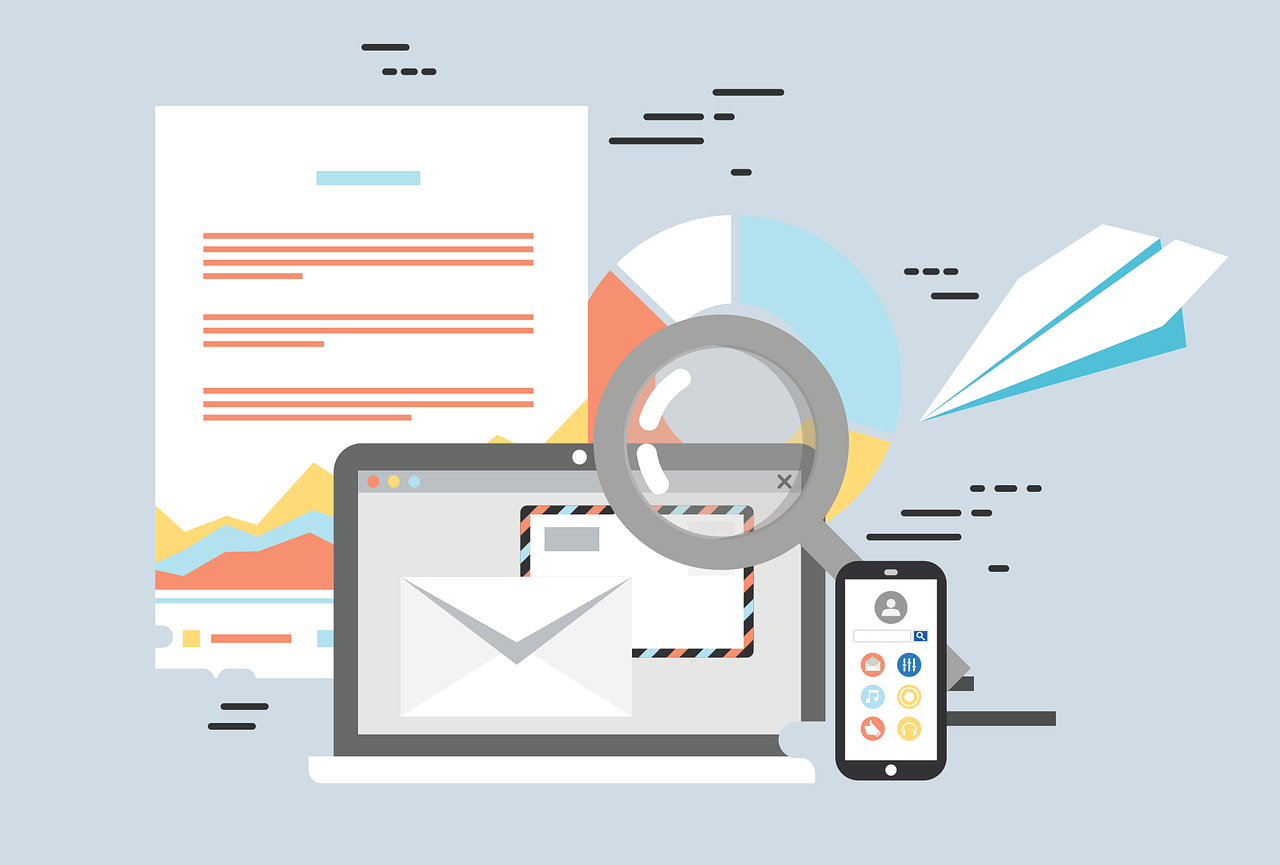Purchasing email lists might seem like a quick way to reach a wide audience, but this approach is fraught with pitfalls that can undermine your marketing efforts and brand reputation.
In this article, we will explore the reasons why buying email lists is a counterproductive strategy and provide you with better alternatives to grow your email marketing efforts organically. From legal complications to potential harm to your brand image, understanding these factors is crucial for any business considering its email marketing strategy.
What is an Email Marketing List?
To put it simply, an email marketing list is a collection of email addresses gathered with the purpose of sending information, updates, promotions, or other content relevant to a business or organization's target audience.

These lists are foundational to email marketing campaigns, as they enable businesses to directly communicate with interested parties who have opted to receive their messages.
The quality of an email marketing list is often determined by how the addresses were acquired. The best lists are organically grown, meaning each email address was willingly provided by an individual who expressed interest in receiving bulk emails from the brand. This email consent is crucial for maintaining high engagement and response rates and ensuring compliance with email marketing regulations, such as the General Data Protection Regulation (GDPR) and the CAN-SPAM Act.
Why Buying Mailing Lists is a Bad Idea
When it comes to email marketing, the temptation to jump-start your efforts by purchasing a ready-made list of email addresses can be strong.
However, there are several compelling reasons why buying email lists for marketing strategy should be avoided:
1. Legal and compliance risks
Purchasing email lists often puts you at risk of violating privacy and anti-spam laws such as GDPR, which require explicit consent from email clients before they can be contacted via email. Non-compliance can lead not only to hefty fines but also serious legal repercussions. It undermines trust in your brand and can have lasting negative impacts on your company's reputation.
2. Low engagement rates
Email messages sent to purchased lists typically see significantly lower engagement rates and worse email performance than those sent to organically grown lists. Since the email recipients did not actively choose to engage with your brand, they are less likely to open, read, or interact with your messages. This results in a poor return on investment for your email marketing efforts.
3. High bounce rates and spam complaints
A purchased email address list often contains outdated or incorrect email addresses, leading to high bounce rates. Moreover, email contacts who did not consent to receive your marketing emails are more likely to report them as spam. Frequent spam complaints can trigger alerts with email service providers, potentially leading to your account being penalized or suspended.
4. Damage to the sender's reputation
Regularly sending emails to uninterested or unintended recipients can severely damage your sender's reputation. Email service providers monitor how recipients interact with your emails, and consistent negative interactions can lead to your unwanted emails being blocked or sent to the spam folder, even for users who might be genuinely interested in your content.
5. Potential for scams
The market for buying and selling email lists is rife with fraudulent activity. Many vendors offer lists that are not only unverified but also populated with illegally harvested emails. Investing in such pre-made email lists can lead not just to financial loss but also to potential legal trouble.
6. No guarantee of accuracy
There is no assurance that the information provided in purchased email lists is accurate or up-to-date. This means you could be sending messages to invalid emails or to individuals who have no interest in your product, wasting resources and damaging your brand's image in the process.
7. Ethical concerns
Using purchased lists can raise ethical concerns among your target audience. Today's consumers are more privacy-conscious and value transparency from brands. Engaging customers through unsolicited emails can lead to negative perceptions and deter them from engaging with your brand in the future.
8. Dependency on unreliable data
Reliance on a list of emails that was bought means your marketing campaigns are built on a shaky foundation. Unreliable data can skew your marketing analytics, making it difficult to measure the true effectiveness of your strategies and make informed decisions.
9. Increased risk of blacklisting
Excessive spam complaints can lead to your email domain or IP addresses being blacklisted by major ISPs and email service providers. Once blacklisted, it becomes significantly more challenging to reach your audience, impacting all future email campaigns.
10. Cost inefficiencies
Of course, to buy an email list for marketing might seem like a quick fix but it often leads to greater cost inefficiencies over time. The money spent on purchasing these lists could instead be invested in building a high-quality, organic list that offers a far higher ROI through engaged and loyal customers.
11. Impacts on email deliverability
Purchasing email lists can have a detrimental effect on your overall email deliverability. Many of these lists contain "spam traps" or email addresses specifically designed to catch spammers. Sending emails to these addresses can signal to email providers that your sending practices are poor, leading to a significant decrease in the delivery rates of all your campaigns.
12. Lack of personalization opportunities
One of the keys to successful email marketing is personalization. When you buy an email list, you lack specific data about the individuals on that list, such as their interests, purchasing history, or how they interact with your brand. This lack of data makes it nearly impossible to personalize your emails effectively, resulting in less engaging and less effective campaigns.
13. Inability to build genuine relationships
Email marketing is not just about sending emails; it's about building relationships. Purchased email lists consist of contacts who have no prior relationship with your brand and likely no interest in forming one. This hinders your ability to create genuine connections and loyalty among your subscribers, which are crucial for long-term business success.
14. Potential violation of email service provider policies
Many email service providers have strict policies against sending unsolicited emails and specifically prohibit the use of purchased lists. Using such lists can result in the suspension or termination of your service account, which can disrupt your entire digital marketing strategy.
15. Decreased overall ROI
Ultimately, the use of purchased email lists tends to result in a lower overall return on investment. The costs associated with acquiring these lists, combined with lower conversion rates, potential legal fees, and damage to your brand, often outweigh any short-term gains. Investing in organic list growth strategies not only complies with best practices but also fosters a more engaged audience and leads to a higher ROI.
How to Create an Email List?
Building an email list organically is the most effective way to ensure that your promotional email marketing campaigns are successful and sustainable.
Here are the key steps to creating an effective email list from scratch:
Offer value through opt-in incentives
One of the most effective ways to grow your email list is to provide value in exchange for email addresses. This can be done through offering free downloads, exclusive content, entry into a contest, or discounts on future purchases. These incentives not only encourage prospective customers to sign up but also set the stage for ongoing engagement.
Use website sign-up forms
Place email sign-up forms prominently on your website, particularly on high-traffic pages such as the homepage, blog, and checkout pages. Make the process as simple as possible, requiring minimal information initially, often just an email address, to reduce barriers to entry.
Leverage social media platforms
Social media can be a powerful tool for opt-in email list building. Regularly post content that directs followers to sign up for your emails, and consider using paid social media advertising to reach a broad audience. Many platforms also offer features that allow direct sign-ups via social media posts.
Host webinars and events
Hosting webinars or online events is a great way to collect email addresses. Participants can register with their email addresses to receive notifications about the event details and follow-up information, which helps to build a list of engaged and interested contacts.
Implement content upgrades
Content upgrades are specific pieces of bonus content offered within articles or blog posts that are accessible in exchange for an email address. For example, if you have a popular blog post about email marketing tips, you might offer a downloadable PDF checklist of those tips as a content upgrade.
Use email marketing tools
Email marketing programs, tools, and email marketing platforms can enhance your efforts to grow and manage your list. These tools often come with features that help in designing attractive forms, automating sign-up confirmations, and segmenting your list based on user behavior, which improves personalization and engagement.
Proactive Campaigns for Zendesk is a great example, as it allows you to automate targeted email campaigns based on customer interactions within Zendesk, ensuring your emails are relevant and timely. This level of customization fosters stronger connections with your audience, driving higher engagement and retention over time.
Ensure transparency and consent
Always make it clear what subscribers are signing up for. Provide information about the type of content they will receive and how often they will receive it. Also, make sure to include an easy way for subscribers to opt out if they choose. This not only builds trust but also helps in maintaining a clean and engaged list.
Engage with personalized content
Once subscribers join your list, keep them engaged with personalized content that meets their interests and needs. This could be through personalized offers, birthday discounts, or content that matches their interaction history with your brand.
7 Alternatives to Buying Email Lists
1. Content marketing
Develop and share high-quality and relevant content that resonates with your target audience. Blogs, videos, infographics, and podcasts are great ways to attract attention and encourage visitors to subscribe to your email list voluntarily without the need to purchase email lists. This approach builds your list and also establishes your brand as a thought leader in your industry.
2. SEO
Optimize your website and content for search engines to increase organic traffic. More visitors to your site mean more opportunities to convert them into email subscribers through strategic placement of sign-up prompts linked to valuable content or offers.
3. Partnerships and collaborations
Partner with other businesses or influencers who share a similar target audience. You can co-create content or offer joint promotions that require email sign-up, benefiting from shared exposure and credibility.
4. Referral programs
Create a referral program that rewards existing subscribers for bringing in new subscribers. This helps grow your list organically without the need to buy a business email list and leverages word-of-mouth, which can be more effective and trustworthy than traditional advertising.
5. Networking and community building
Engage with potential customers through online forums, social media groups, and professional networks. By actively participating in discussions and providing value, you can encourage interested individuals to join your email list for more insightful content or exclusive offers.
6. Offline events
Utilize offline events such as trade shows, workshops, and conferences to collect email addresses. Ensure you have a clear and compliant method for attendees to opt-in to your email list, such as a signup sheet or digital kiosk.
7. Interactive tools and quizzes
Implement interactive content like tools, quizzes, or assessments on your website. These can provide immediate value to users in exchange for their email addresses, such as personalized reports or insights based on their quiz answers.

Final Words
Building a strong, organic, and quality email list is an essential component of successful email marketing.
While the allure of quick gains from purchased email lists can be tempting, the risks and potential long-term damage to your brand far outweigh any short-term benefits.
Investing time and resources in ethical list-building practices ensures compliance with legal standards and fosters genuine relationships with your audience, leading to higher engagement and conversion rates.
FAQ
Is it legal to buy email lists?
The legality of buying email marketing lists depends on the country and specific regulations governing email marketing. In many jurisdictions, including those under GDPR in Europe, purchasing and using email lists without explicit consent from the recipients can lead to significant legal issues and fines. It's essential to understand and comply with local laws regarding email marketing to avoid legal ramifications.
How much does it cost to buy email lists?
The cost of buying an email list can vary widely depending on the quality of the list, the number of email addresses included, and the specificity of the segmentation. Prices can range from a few hundred to several thousand dollars. However, the real cost comes from the potential negative impacts on your email deliverability, sender reputation, and overall marketing effectiveness.
Should you buy an email list?
Buying business email lists is generally not recommended. It poses numerous risks, including legal issues, low engagement rates, high bounce rates, and potential harm to your brand's reputation. Instead, focusing on building an organic email list through ethical practices is more beneficial and sustainable in the long run. This approach ensures that your subscribers are genuinely interested in your products or services, leading to better engagement and conversion rates.








